Did you know that Mexico is the country with the most sea turtle species that come to nest or complete their reproductive cycle?
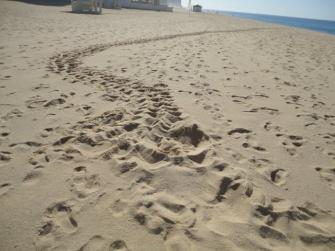
Sea turtles are arriving at shores all around the country of Mexico, including species like loggerheads, green sea turtles and olive ridleys; even though the olive ridley species is among the most common in the world, it’s already on the endangered species list.
Olive ridley turtles come to Los Cabos and the entire Pacific Ocean every year, and they’re one of our most valued guests at Sandos Finisterra. We begin to welcome each turtle months in advance to welcome them with the VIP treatment and help preserve its life cycle.
How can we recognize an olive ridley sea turtle?
The olive ridley sea turtle, also known as the Pacific ridley, is a marine reptile with a similar size to a Kemp’s ridley. The main difference between the olive ridley and the Kemp’s ridley (which mainly nests on the Gulf of Mexico and is also very beautiful) is that the olive ridley can sometimes have a light reddish color, and they have very different reproductive behaviors.
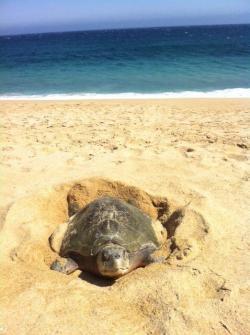
The nesting habits of the olive ridley sea turtle are very unique compared to other sea turtles. Instead of each female making one nest, groups of olive ridley mothers usually work together to create one very big nest where they all lay their eggs. However, some olive ridley mothers still prefer to have their own nest and stay away from these groups.
In fact, at Sandos Finisterra, our sea turtle specialists are always watching to see when sea turtles check in to our beach so we can spot them on time and prepare the environment so they can make their nest.
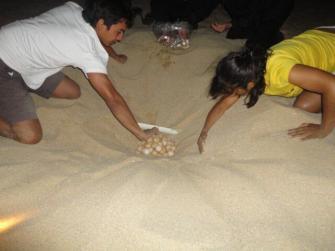
Important facts to know about the sea turtle reproductive cycle
Olive ridley sea turtles can arrive at any time of year, but we usually see more arrivals from March to December.
If you spot a turtle while walking along the beach, BE CAREFUL! They are not aggressive animals, they’re very beautiful, and yes their nesting process is fascinating, but it’s important for you to keep your distance. This has nothing to do with them being mean or aggressive; they’re just in a maternal mood and the first thing they’ll try to do on leaving the ocean is find a safe and quiet place for their babies.
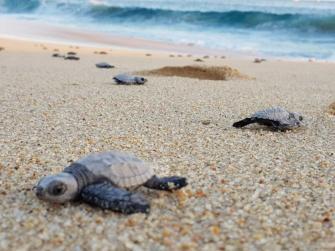
Why? Sea turtles never, EVER get to meet their babies, but this doesn’t mean they don’t care. On the contrary, they’ll check every little detail to make sure their babies will have the best and safest conditions when they hatch, so if they see a human staring at them too closely or for too long, they’ll feel stalked and might dive back into the ocean and not return (sometimes ever again).
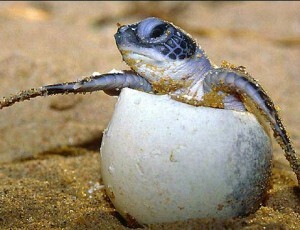
If you’re staying at a hotel like Sandos Finisterra, where we actually have two biologists dedicated to sea turtles, it’s important to follow all the rules given by the experts. Remember that we’re all a part of this planet, and it’s our priority as a hotel and as humans to take good care of nature and to make the Earth a better place.
What can we do to help the sea turtles?
Like most endangered animals, the main predator of sea turtles is (directly or indirectly) human beings. Our first recommendation is to immediately tell any officer or employee around the beach area of you spot any kind of illegal fishing or if you see somebody attacking a turtle nest.
In some situations, turtles end up in fishing nets that were not meant for them. If the net doesn’t kill them right away, they get injured and eventually die. If you see a sea turtle while fishing, please act responsibly and delicately to free the turtle from your net so that she or he can find their way to the shore.
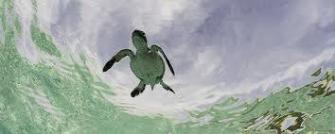
And most importantly, eco-friendly habits are paramount when it comes to living in harmony with nature. “No straw” campaigns are so popular now, but there are so many other ways to reduce plastic use that we haven’t added to our everyday lives yet! Remember that plastic is the material that most affects our oceans and the animals living there.
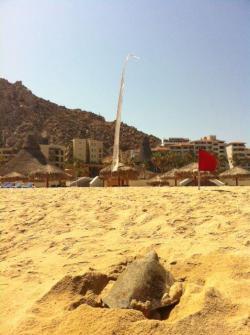
Our advice is to work on eliminating the use of plastic products 100%, then during your visit to Los Cabos, visit our biology experts at the hotel, who will tell you even more about these amazing creatures. Sometimes we can make so many mistakes without even knowing, and there’s so much we can do to create a better and healthier environment for sea turtles and the rest of the world. At Sandos Finisterra, we truly believe that one hotel can make a difference.
